Deck 9: Profit Maximization
Question
Question
Question
Question
Question
Question
Question
Question
Question
Question
Question
Question
Question
Question
Question
Question
Question
Question
Question
Question
Question
Question
Question
Question
Question
Question
Question
Question
Question
Question
Question
Question
Question
Question
Question
Question
Question
Question
Question
Question
Question
Question
Question
Question
Question
Question
Question
Question
Question
Question
Question
Question
Question
Question
Question
Question
Question
Question
Question
Question
Question
Question
Question
Question
Question
Question
Question
Question
Question
Question
Question
Question

Unlock Deck
Sign up to unlock the cards in this deck!
Unlock Deck
Unlock Deck
1/72
Play
Full screen (f)
Deck 9: Profit Maximization
1
A price-taking firm's variable cost function is C = Q3,where Q is the output per week.It has an avoidable fixed cost of $1,024 per week.Its marginal cost is MC = 3Q2.What is the profit maximizing output if the price is P = $192?
A) 0 or 5.33 or 8
B) 5.33 or 8
C) 0 or 5.33
D) 0 or 8
A) 0 or 5.33 or 8
B) 5.33 or 8
C) 0 or 5.33
D) 0 or 8
0 or 8
2
In which situation might a company NOT want to maximize profit?
A) A small business owner who sells a highly specialized product at a high price in order to compete with more established businesses in the area
B) A family-owned company that has to decide between hiring a family member and hiring a highly-qualified external candidate
C) A conglomerate with a highly streamlined supply chain who sells generic goods
D) A corporation that has performed poorly in the last two quarters and is looking for new upper-management
A) A small business owner who sells a highly specialized product at a high price in order to compete with more established businesses in the area
B) A family-owned company that has to decide between hiring a family member and hiring a highly-qualified external candidate
C) A conglomerate with a highly streamlined supply chain who sells generic goods
D) A corporation that has performed poorly in the last two quarters and is looking for new upper-management
A family-owned company that has to decide between hiring a family member and hiring a highly-qualified external candidate
3
The extra revenue produced by the change in quantity,on a per-unit basis,is called:
A) marginal benefit.
B) marginal revenue.
C) inframarginal units.
D) both marginal benefit and marginal revenue.
A) marginal benefit.
B) marginal revenue.
C) inframarginal units.
D) both marginal benefit and marginal revenue.
both marginal benefit and marginal revenue.
4
To earn the greatest possible profit,a firm must:
A) maximize revenue less cost.
B) minimize revenue less cost.
C) maximize quantity at any price.
D) maximize price at any quantity.
A) maximize revenue less cost.
B) minimize revenue less cost.
C) maximize quantity at any price.
D) maximize price at any quantity.

Unlock Deck
Unlock for access to all 72 flashcards in this deck.
Unlock Deck
k this deck
5
Profit is:
A) Revenue - Cost.
B) Revenue + Cost.
C) Revenue/Cost.
D) Cost - Revenue.
A) Revenue - Cost.
B) Revenue + Cost.
C) Revenue/Cost.
D) Cost - Revenue.

Unlock Deck
Unlock for access to all 72 flashcards in this deck.
Unlock Deck
k this deck
6
Given the inverse demand function P(Q)= 250 - Q,what is the demand function?
A) Qd = D(P) = 250 - P
B) Qd = D(P) = 250/P
C) Qd = D(P) = P + 250
D) Qd = D(P) = 250 + P
A) Qd = D(P) = 250 - P
B) Qd = D(P) = 250/P
C) Qd = D(P) = P + 250
D) Qd = D(P) = 250 + P

Unlock Deck
Unlock for access to all 72 flashcards in this deck.
Unlock Deck
k this deck
7
The relationship between a firm's price and sales quantity is described by the ______ for its product.
A) demand curve
B) supply curve
C) marginal cost curve
D) average cost curve
A) demand curve
B) supply curve
C) marginal cost curve
D) average cost curve

Unlock Deck
Unlock for access to all 72 flashcards in this deck.
Unlock Deck
k this deck
8
Which of the following is NOT a way to express the formula for profit?
A) Profit = Revenue - Cost
B) π = R(Q) - C(Q)
C) π = [P(Q) × Q] - [C(Q) × Q]
D) π = [P(Q) × Q] - C(Q)
A) Profit = Revenue - Cost
B) π = R(Q) - C(Q)
C) π = [P(Q) × Q] - [C(Q) × Q]
D) π = [P(Q) × Q] - C(Q)

Unlock Deck
Unlock for access to all 72 flashcards in this deck.
Unlock Deck
k this deck
9
Refer to Figure 9.1.At what price and quantity combination is profit maximized? 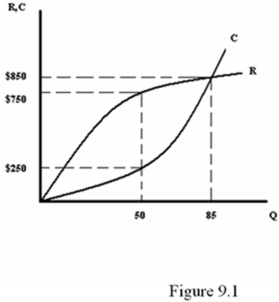
A) Q = 50; P = $5
B) Q = 50; P = $15
C) Q = 85; P = $10
D) Q = 85; P = $15

A) Q = 50; P = $5
B) Q = 50; P = $15
C) Q = 85; P = $10
D) Q = 85; P = $15

Unlock Deck
Unlock for access to all 72 flashcards in this deck.
Unlock Deck
k this deck
10
How much a firm must charge to sell any given quantity of their product is described by a(n):
A) demand curve.
B) supply curve.
C) inverse demand function.
D) production function.
A) demand curve.
B) supply curve.
C) inverse demand function.
D) production function.

Unlock Deck
Unlock for access to all 72 flashcards in this deck.
Unlock Deck
k this deck
11
Refer to Figure 9.2.Whenever a CD is sold,5% of the revenue goes to the artist and the remainder of the revenue goes to the record company.The graph above depicts R,the total revenue from sales; (0.95)R,the record company's share; and C,the cost of producing the CD (which the record companies bears).At what quantity would the record company like to produce the CD? 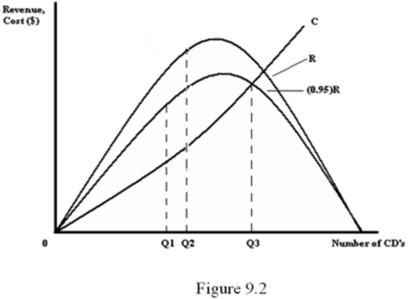
A) 0
B) Q1
C) Q2
D) Q3

A) 0
B) Q1
C) Q2
D) Q3

Unlock Deck
Unlock for access to all 72 flashcards in this deck.
Unlock Deck
k this deck
12
Refer to Figure 9.1.What is the maximum profit that can be achieved? 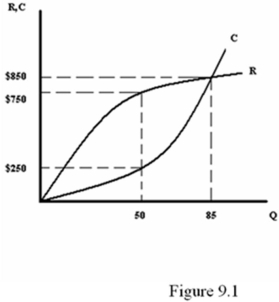
A) $250
B) $500
C) $750
D) $850

A) $250
B) $500
C) $750
D) $850

Unlock Deck
Unlock for access to all 72 flashcards in this deck.
Unlock Deck
k this deck
13
Refer to Figure 9.1.The firm's profit stays the same whether it produces: 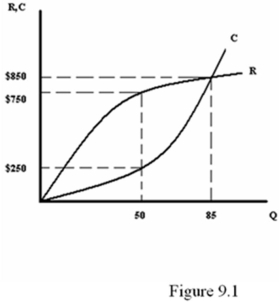
A) 0 or 50 units of output.
B) 50 or 85 units of output.
C) 0 or 85 units of output.
D) 0, 50 or 85 units of output.

A) 0 or 50 units of output.
B) 50 or 85 units of output.
C) 0 or 85 units of output.
D) 0, 50 or 85 units of output.

Unlock Deck
Unlock for access to all 72 flashcards in this deck.
Unlock Deck
k this deck
14
Suppose you own a store that sells top-of-the-line MP3 players.You have determined that the demand function for your MP3 players is Qd = D(P)= 1200 - 4P.At what price would you sell the MP3 players if you wanted to sell 100 of them?
A) $250
B) $275
C) $280
D) $300
A) $250
B) $275
C) $280
D) $300

Unlock Deck
Unlock for access to all 72 flashcards in this deck.
Unlock Deck
k this deck
15
A firm's profit is denoted by the Greek letter:
A) rho.
B) delta.
C) chi.
D) pi.
A) rho.
B) delta.
C) chi.
D) pi.

Unlock Deck
Unlock for access to all 72 flashcards in this deck.
Unlock Deck
k this deck
16
Given a demand function of Qd = D(P)= 500 - 10P,what is the inverse demand function?
A) D(P) = 50 - P
B) P(Q) = 50P
C) P(Q) = 50 - (Q/10)
D) P(Q) = 500 - 10Q
A) D(P) = 50 - P
B) P(Q) = 50P
C) P(Q) = 50 - (Q/10)
D) P(Q) = 500 - 10Q

Unlock Deck
Unlock for access to all 72 flashcards in this deck.
Unlock Deck
k this deck
17
A price-taking firm's variable cost function is C = Q3,where Q is the output per week.It has a sunk fixed cost of $2,000 per week.Its marginal cost is MC = 3Q2.What is the profit-maximizing output if the price is P = $192?
A) 0
B) 6
C) 8
D) 10
A) 0
B) 6
C) 8
D) 10

Unlock Deck
Unlock for access to all 72 flashcards in this deck.
Unlock Deck
k this deck
18
A price-taking firm's variable cost function is C = Q3,where Q is the output per week.It has an avoidable fixed cost of $2,000 per week.Its marginal cost is MC = 3Q2.What is the profit maximizing output if the price is P = $192?
A) 0
B) 6
C) 8
D) 10
A) 0
B) 6
C) 8
D) 10

Unlock Deck
Unlock for access to all 72 flashcards in this deck.
Unlock Deck
k this deck
19
Refer to Figure 9.2.Whenever a CD is sold,5% of the revenue goes to the artist and the remainder of the revenue goes to the record company.The graph above depicts R,the total revenue from sales; (0.95)R,the record company's share; and C,the cost of producing the CD (which the record companies bears).At what quantity would the artist prefer to produce the CD? 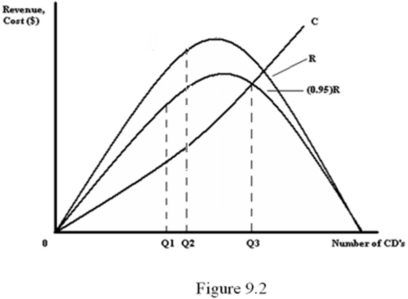
A) 0
B) Q1
C) Q2
D) Q3

A) 0
B) Q1
C) Q2
D) Q3

Unlock Deck
Unlock for access to all 72 flashcards in this deck.
Unlock Deck
k this deck
20
Suppose you own a store that sells computers.You have determined that the demand function for your computers is Qd = D(P)= 900 - 3P.At what price would you sell the computers if you wanted to sell 60 of them?
A) $250
B) $275
C) $280
D) $300
A) $250
B) $275
C) $280
D) $300

Unlock Deck
Unlock for access to all 72 flashcards in this deck.
Unlock Deck
k this deck
21
When a firm is a price taker,changes in its sales quantity have ______ effect on the price it can charge.
A) a positive
B) a negative
C) no
D) little
A) a positive
B) a negative
C) no
D) little

Unlock Deck
Unlock for access to all 72 flashcards in this deck.
Unlock Deck
k this deck
22
If a firm has no ______ costs,then the profit from shutting down is zero.
A) fixed
B) variable
C) opportunity
D) sunk
A) fixed
B) variable
C) opportunity
D) sunk

Unlock Deck
Unlock for access to all 72 flashcards in this deck.
Unlock Deck
k this deck
23
Refer to Figure 9.3.At what quantity is the firm maximizing profit? 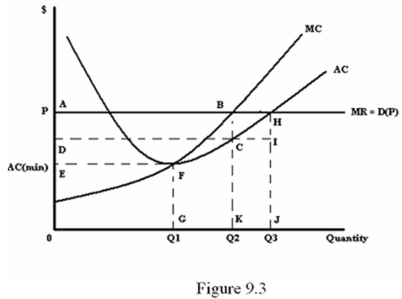
A) 0
B) Q1
C) Q2
D) Q3

A) 0
B) Q1
C) Q2
D) Q3

Unlock Deck
Unlock for access to all 72 flashcards in this deck.
Unlock Deck
k this deck
24
Which of the following is NOT true about marginal revenue?
A) It is a firm's marginal benefit.
B) It is defined as the extra revenue generated by the production of one more unit.
C) It can be expressed mathematically as MR = [R(Q - ∆Q) - R(Q)]/∆Q.
D) It can be expressed mathematically as ∆R/∆Q.
A) It is a firm's marginal benefit.
B) It is defined as the extra revenue generated by the production of one more unit.
C) It can be expressed mathematically as MR = [R(Q - ∆Q) - R(Q)]/∆Q.
D) It can be expressed mathematically as ∆R/∆Q.

Unlock Deck
Unlock for access to all 72 flashcards in this deck.
Unlock Deck
k this deck
25
The output expansion effect of the sale of a firm's last ΔQ units of output is:
A) the additional revenue from selling ΔQ units at price P(Q).
B) the reduced revenue from selling (Q - ΔQ) units at a lower price of P(Q).
C) the additional revenue from selling ΔQ units at price P(Q + ΔQ).
D) the reduced revenue from selling (Q - ΔQ) units at a lower price of P(Q - ΔQ).
A) the additional revenue from selling ΔQ units at price P(Q).
B) the reduced revenue from selling (Q - ΔQ) units at a lower price of P(Q).
C) the additional revenue from selling ΔQ units at price P(Q + ΔQ).
D) the reduced revenue from selling (Q - ΔQ) units at a lower price of P(Q - ΔQ).

Unlock Deck
Unlock for access to all 72 flashcards in this deck.
Unlock Deck
k this deck
26
When a firm's demand curve is downward-sloping,its marginal revenue at any positive sales quantity is ______ its price.
A) greater than
B) less than
C) equal to
D) less than or equal to
A) greater than
B) less than
C) equal to
D) less than or equal to

Unlock Deck
Unlock for access to all 72 flashcards in this deck.
Unlock Deck
k this deck
27
Identifying any positive sales quantities at which MR = MC (and determining which positive sales quantity is best if there is more than one)is the description of what rule?
A) Interior Action Rule
B) Quantity Rule
C) Shut-down Rule
D) Profit-maximizing Rule
A) Interior Action Rule
B) Quantity Rule
C) Shut-down Rule
D) Profit-maximizing Rule

Unlock Deck
Unlock for access to all 72 flashcards in this deck.
Unlock Deck
k this deck
28
Refer to Figure 9.3.What is the smallest sales quantity that this firm will produce at any price? 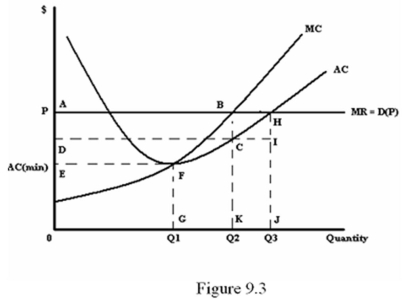
A) 0
B) Q1
C) Q2
D) Q3

A) 0
B) Q1
C) Q2
D) Q3

Unlock Deck
Unlock for access to all 72 flashcards in this deck.
Unlock Deck
k this deck
29
When actions are finely divisible marginal benefit is ______ marginal cost at an interior best choice.
A) greater than
B) less than
C) equal to
D) greater than or equal to
A) greater than
B) less than
C) equal to
D) greater than or equal to

Unlock Deck
Unlock for access to all 72 flashcards in this deck.
Unlock Deck
k this deck
30
A firm that is a price taker faces a perfectly ______ demand curve.
A) horizontal
B) vertical
C) inelastic
D) convex
A) horizontal
B) vertical
C) inelastic
D) convex

Unlock Deck
Unlock for access to all 72 flashcards in this deck.
Unlock Deck
k this deck
31
Refer to Figure 9.3.The firm's profit it represented by what area? 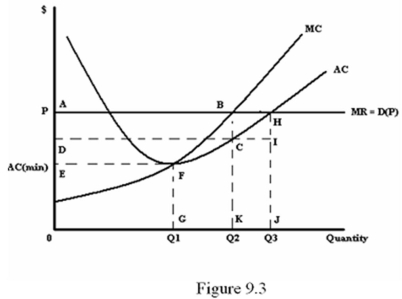
A) AHID
B) ABCD
C) DCK0
D) EFG0

A) AHID
B) ABCD
C) DCK0
D) EFG0

Unlock Deck
Unlock for access to all 72 flashcards in this deck.
Unlock Deck
k this deck
32
Firms in perfectly competitive markets take the ______ as given when deciding how much to sell.
A) market quantity
B) lowest prices
C) market prices
D) input prices
A) market quantity
B) lowest prices
C) market prices
D) input prices

Unlock Deck
Unlock for access to all 72 flashcards in this deck.
Unlock Deck
k this deck
33
Any price ______ will cause the firm to shut down production.
A) below the minimum of MC
B) above the maximum of AC
C) below the minimum of AC
D) between MC and AC
A) below the minimum of MC
B) above the maximum of AC
C) below the minimum of AC
D) between MC and AC

Unlock Deck
Unlock for access to all 72 flashcards in this deck.
Unlock Deck
k this deck
34
A price-taking firm's marginal revenue is ______ the price of its output.
A) equal to
B) greater than
C) less than
D) less than or equal to
A) equal to
B) greater than
C) less than
D) less than or equal to

Unlock Deck
Unlock for access to all 72 flashcards in this deck.
Unlock Deck
k this deck
35
The price reduction effect of the sale of a firm's last ΔQ units of output is:
A) the additional revenue from selling ΔQ units at price P(Q).
B) the reduced revenue from selling (Q - ΔQ) units at a lower price of P(Q).
C) the additional revenue from selling ΔQ units at price P(Q + ΔQ).
D) the reduced revenue from selling (Q - ΔQ) units at a lower price of P(Q - ΔQ).
A) the additional revenue from selling ΔQ units at price P(Q).
B) the reduced revenue from selling (Q - ΔQ) units at a lower price of P(Q).
C) the additional revenue from selling ΔQ units at price P(Q + ΔQ).
D) the reduced revenue from selling (Q - ΔQ) units at a lower price of P(Q - ΔQ).

Unlock Deck
Unlock for access to all 72 flashcards in this deck.
Unlock Deck
k this deck
36
When a firm's profit maximizing sales level is positive,its marginal revenue is ______ its marginal cost at that quantity.
A) greater than
B) less than
C) equal to
D) less than or equal to
A) greater than
B) less than
C) equal to
D) less than or equal to

Unlock Deck
Unlock for access to all 72 flashcards in this deck.
Unlock Deck
k this deck
37
Checking to see whether the most profitable positive sales quantity results in a greater profit than not producing at all is the basis of what rule?
A) Interior Action Rule
B) Quantity Rule
C) Shut-down Rule
D) Profit-maximizing Rule
A) Interior Action Rule
B) Quantity Rule
C) Shut-down Rule
D) Profit-maximizing Rule

Unlock Deck
Unlock for access to all 72 flashcards in this deck.
Unlock Deck
k this deck
38
Suppose a firm lowers its price in order to increase sales.The lower price will reduce the revenue the firm earns on the:
A) marginal units.
B) inframarginal units.
C) surplus units.
D) incremental units.
A) marginal units.
B) inframarginal units.
C) surplus units.
D) incremental units.

Unlock Deck
Unlock for access to all 72 flashcards in this deck.
Unlock Deck
k this deck
39
What type of cost has NO impact on determining the profit-maximizing sales quantity?
A) Avoidable fixed costs
B) Sunk fixed costs
C) Variable costs
D) Average variable costs
A) Avoidable fixed costs
B) Sunk fixed costs
C) Variable costs
D) Average variable costs

Unlock Deck
Unlock for access to all 72 flashcards in this deck.
Unlock Deck
k this deck
40
A firm is a ______ when it can sell as much as it wants at some given price P,but nothing at any higher price.
A) monopoly
B) oligopoly
C) price taker
D) price setter
A) monopoly
B) oligopoly
C) price taker
D) price setter

Unlock Deck
Unlock for access to all 72 flashcards in this deck.
Unlock Deck
k this deck
41
A firm's marginal and average costs may differ in the long and short run because:
A) in the short run all inputs are fixed.
B) in the long run all inputs are fixed.
C) in the short run all inputs are variable.
D) in the long run all inputs are variable.
A) in the short run all inputs are fixed.
B) in the long run all inputs are fixed.
C) in the short run all inputs are variable.
D) in the long run all inputs are variable.

Unlock Deck
Unlock for access to all 72 flashcards in this deck.
Unlock Deck
k this deck
42
Refer to Figure 9.4.In the short run,how much should the firm produce at the price P3? 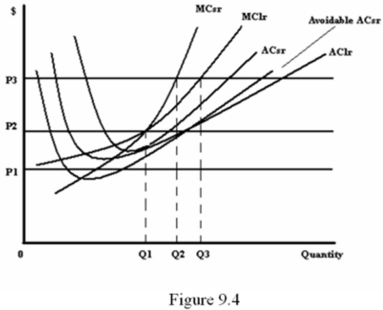
A) 0
B) Q1
C) Q2
D) Q3

A) 0
B) Q1
C) Q2
D) Q3

Unlock Deck
Unlock for access to all 72 flashcards in this deck.
Unlock Deck
k this deck
43
Dan is the owner of a price-taking company that manufactures sporting goods.One particular facility Dan owns produces baseball bats and baseball gloves.His cost function for baseball bats is CB(QB,QG)= 100QB + QB2 + QBQG and the marginal cost is MCB = 100 + 2QB + QG,where QB is the output level for bats and QG is the output level for gloves.Dan's cost function for baseball gloves is CG(QB,QG)= 50QG + QG2 + QGQB,and the marginal cost is MCG = 50 + 2QG + QB.The price of a baseball bat is $240 and the price of a baseball glove is $150.What is the profit-maximizing sales quantity for baseball bats?
A) 10
B) 20
C) 30
D) 60
A) 10
B) 20
C) 30
D) 60

Unlock Deck
Unlock for access to all 72 flashcards in this deck.
Unlock Deck
k this deck
44
Refer to Figure 9.5.The firm is producing Q units.Which area represents avoidable cost? 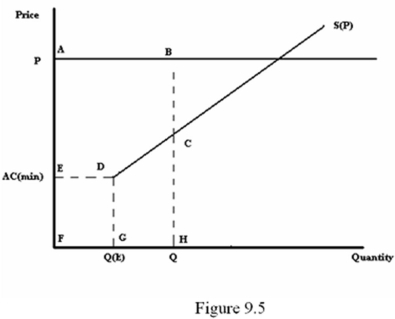
A) ABCDE
B) EDGF
C) EDCHF
D) CHGD

A) ABCDE
B) EDGF
C) EDCHF
D) CHGD

Unlock Deck
Unlock for access to all 72 flashcards in this deck.
Unlock Deck
k this deck
45
At any price equal to ______ a firm can maximize profit either by producing the best positive sales quantity or by shutting down.
A) the maximum of AC
B) the minimum of MR
C) the minimum of AC
D) the minimum of MC
A) the maximum of AC
B) the minimum of MR
C) the minimum of AC
D) the minimum of MC

Unlock Deck
Unlock for access to all 72 flashcards in this deck.
Unlock Deck
k this deck
46
How would a $10 increase in per-unit input costs affect a price-taking firm's supply curve?
A) MC would increase by $10, and AC would decrease by $10.
B) AC would increase by $10, and MC would decrease by $10.
C) MC and AC would both decrease by $10.
D) MC and AC would both increase by $10.
A) MC would increase by $10, and AC would decrease by $10.
B) AC would increase by $10, and MC would decrease by $10.
C) MC and AC would both decrease by $10.
D) MC and AC would both increase by $10.

Unlock Deck
Unlock for access to all 72 flashcards in this deck.
Unlock Deck
k this deck
47
The Law of Supply ______ holds for price-taking firms.
A) always
B) usually
C) occasionally
D) never
A) always
B) usually
C) occasionally
D) never

Unlock Deck
Unlock for access to all 72 flashcards in this deck.
Unlock Deck
k this deck
48
Refer to Figure 9.4.In the short run,how much should the firm produce at the price P1? 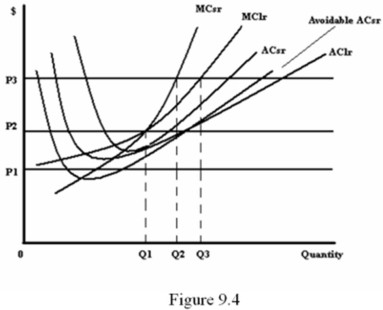
A) 0
B) Q1
C) Q2
D) Q3

A) 0
B) Q1
C) Q2
D) Q3

Unlock Deck
Unlock for access to all 72 flashcards in this deck.
Unlock Deck
k this deck
49
Refer to Figure 9.5.The firm is producing Q units.Which area represents producer surplus? 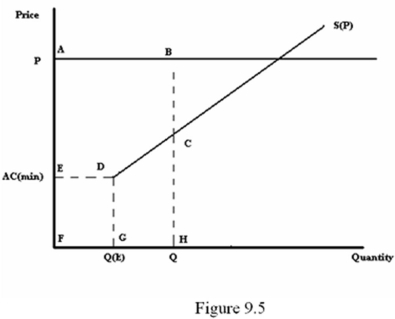
A) ABCDE
B) EDGF
C) EDCHF
D) ABHF

A) ABCDE
B) EDGF
C) EDCHF
D) ABHF

Unlock Deck
Unlock for access to all 72 flashcards in this deck.
Unlock Deck
k this deck
50
Jessica owns a company that makes pre-packaged sandwiches for convenience stores.The market price for a sandwich is $5 and Jessica is a price-taker.Her daily cost for making sandwiches is C(Q)= 2.5Q + (Q2/40)and her marginal cost is MC = 2.5 + (Q/20).How many sandwiches should Jessica produce each day?
A) 20
B) 40
C) 45
D) 50
A) 20
B) 40
C) 45
D) 50

Unlock Deck
Unlock for access to all 72 flashcards in this deck.
Unlock Deck
k this deck
51
Since sunk costs are incurred no matter what:
A) they are relevant in deciding how much to produce.
B) they are essential in the profit-maximizing sales quantity formula.
C) they can generally be ignored in making economic decisions.
D) they are considered fixed costs.
A) they are relevant in deciding how much to produce.
B) they are essential in the profit-maximizing sales quantity formula.
C) they can generally be ignored in making economic decisions.
D) they are considered fixed costs.

Unlock Deck
Unlock for access to all 72 flashcards in this deck.
Unlock Deck
k this deck
52
Refer to Figure 9.4.In the long run,how much should the firm produce at the price P3? 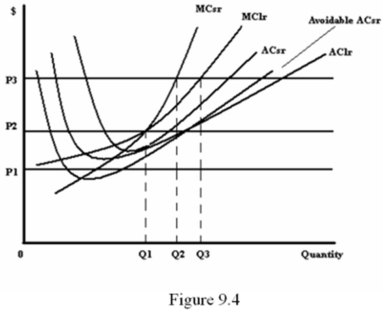
A) 0
B) Q1
C) Q2
D) Q3

A) 0
B) Q1
C) Q2
D) Q3

Unlock Deck
Unlock for access to all 72 flashcards in this deck.
Unlock Deck
k this deck
53
Refer to Figure 9.5.The firm is producing Q units.Which area represents revenue? 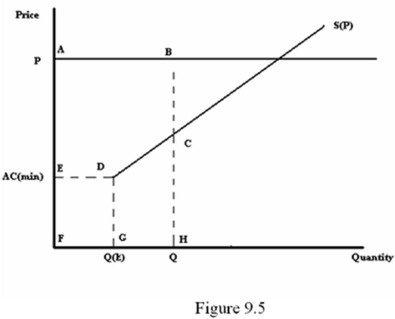
A) ABCDE
B) CHGD
C) EDGF
D) ABHF

A) ABCDE
B) CHGD
C) EDGF
D) ABHF

Unlock Deck
Unlock for access to all 72 flashcards in this deck.
Unlock Deck
k this deck
54
Jessica owns a company that makes pre-packaged sandwiches for convenience stores.The market price for a sandwich is $5 and Jessica is a price-taker.Her daily variable cost for making sandwiches is C(Q)= 2.5Q + (Q2/40)and her marginal cost is MC = 2.5 + (Q/20).What is the average cost of a sandwich at the quantity of sandwiches Jessica should be selling each day?
A) $1.25
B) $2.50
C) $3.75
D) $6.25
A) $1.25
B) $2.50
C) $3.75
D) $6.25

Unlock Deck
Unlock for access to all 72 flashcards in this deck.
Unlock Deck
k this deck
55
For a firm that produces several products,the marginal cost of producing one product often depends on:
A) the level of demand for other products.
B) the production level of other products.
C) the price of other products.
D) the quality of other products.
A) the level of demand for other products.
B) the production level of other products.
C) the price of other products.
D) the quality of other products.

Unlock Deck
Unlock for access to all 72 flashcards in this deck.
Unlock Deck
k this deck
56
How would a $10 increase in an avoidable per-unit fixed cost effect a price-taking firm's supply curve?
A) MC would increase by $10, and AC would not change.
B) AC would increase by $10, and MC would not change.
C) MC and AC would both decrease by $10.
D) MC and AC would both increase by $10.
A) MC would increase by $10, and AC would not change.
B) AC would increase by $10, and MC would not change.
C) MC and AC would both decrease by $10.
D) MC and AC would both increase by $10.

Unlock Deck
Unlock for access to all 72 flashcards in this deck.
Unlock Deck
k this deck
57
A firm's producer surplus equals its:
A) profit less its avoidable costs.
B) revenue less its avoidable costs.
C) profit less sunk costs.
D) revenue less sunk costs.
A) profit less its avoidable costs.
B) revenue less its avoidable costs.
C) profit less sunk costs.
D) revenue less sunk costs.

Unlock Deck
Unlock for access to all 72 flashcards in this deck.
Unlock Deck
k this deck
58
A competitive firm's profit-maximizing sales quantity ______ when the market price increases.
A) cannot decrease
B) cannot increase
C) may increase or decrease
D) will always decrease
A) cannot decrease
B) cannot increase
C) may increase or decrease
D) will always decrease

Unlock Deck
Unlock for access to all 72 flashcards in this deck.
Unlock Deck
k this deck
59
The Law of Supply states that when the market price ______,the profit-maximizing sales quantity for a price taking-firm never ______.
A) increases; increases
B) increases; decreases
C) decreases; decreases
D) decreases; stays the same
A) increases; increases
B) increases; decreases
C) decreases; decreases
D) decreases; stays the same

Unlock Deck
Unlock for access to all 72 flashcards in this deck.
Unlock Deck
k this deck
60
Jessica owns a company that makes pre-packaged sandwiches for convenience stores.The market price for a sandwich is $5 and Jessica is a price-taker.Her daily variable cost for making sandwiches is C(Q)= 2.5Q + (Q2/40)and her marginal cost is MC = 2.5 + (Q/20).She is currently producing sandwiches according to the quantity rule.What should Jessica do if she has an avoidable fixed cost of $50 a day?
A) She should keep producing sandwiches because the price is greater than the minimum of average fixed cost.
B) She should keep producing sandwiches because she is maximizing profit at the current quantity.
C) She should shut down production because the price is greater than the minimum of average cost.
D) She should shut down production because the fixed cost can be avoided if she does.
A) She should keep producing sandwiches because the price is greater than the minimum of average fixed cost.
B) She should keep producing sandwiches because she is maximizing profit at the current quantity.
C) She should shut down production because the price is greater than the minimum of average cost.
D) She should shut down production because the fixed cost can be avoided if she does.

Unlock Deck
Unlock for access to all 72 flashcards in this deck.
Unlock Deck
k this deck
61
Dan is the owner of a price-taking company that manufactures sporting goods.One particular facility Dan owns produces baseball bats and baseball gloves.His cost function for baseball bats is CB(QB,QG)= 100QB + QB2 + QBQG and the marginal cost is MCB = 100 + 2QB + QG,where QB is the output level for bats and QG is the output level for gloves.Dan's cost function for baseball gloves is CG(QB,QG)= 50QG + QG2 + QGQB,and the marginal cost is MCG = 50 + 2QG + QB.The price of a baseball bat is $240 and the price of a baseball glove is $150.If he only produced gloves,what would Dan's profit be if he produces the profit-maximizing quantity?
A) $2,000
B) $2,200
C) $2,500
D) $3,100
A) $2,000
B) $2,200
C) $2,500
D) $3,100

Unlock Deck
Unlock for access to all 72 flashcards in this deck.
Unlock Deck
k this deck
62
Dan is the owner of a price-taking company that manufactures sporting goods.One particular facility Dan owns produces baseball bats and baseball gloves.His cost function for baseball bats is CB(QB,QG)= 100QB + QB2 + QBQG and the marginal cost is MCB = 100 + 2QB + QG,where QB is the output level for bats and QG is the output level for gloves.Dan's cost function for baseball gloves is CG(QB,QG)= 50QG + QG2 + QGQB,and the marginal cost is MCG = 50 + 2QG + QB.The price of a baseball bat is $240 and the price of a baseball glove is $150.What is the profit-maximizing sales quantity for baseball gloves?
A) 10
B) 20
C) 30
D) 60
A) 10
B) 20
C) 30
D) 60

Unlock Deck
Unlock for access to all 72 flashcards in this deck.
Unlock Deck
k this deck
63
Suppose a competitive firm produces spaghetti dinners.The market price of a spaghetti dinner is $20.The cost of making the dinners is given by C(Q)= 10Q + (Q2/160).The marginal cost is given by MC = 10 + (Q/80).
(a)How many spaghetti dinners should the firm make each day?
(b)What if the firm has avoidable fixed costs of $1562.50?
(c)What is the firm's supply function if there is no avoidable fixed cost?
(d)What is the supply function if the firm has avoidable fixed costs of $1562.50?
(a)How many spaghetti dinners should the firm make each day?
(b)What if the firm has avoidable fixed costs of $1562.50?
(c)What is the firm's supply function if there is no avoidable fixed cost?
(d)What is the supply function if the firm has avoidable fixed costs of $1562.50?

Unlock Deck
Unlock for access to all 72 flashcards in this deck.
Unlock Deck
k this deck
64
Suppose that a price-taking firm charges $12 for its product and has a cost function given by C(Q)= 2Q + (Q2/60).The corresponding marginal cost is given by MC(Q)= 2 + (Q/30).How much output should the firm produce? What if the firm has $2,000 of avoidable fixed costs?

Unlock Deck
Unlock for access to all 72 flashcards in this deck.
Unlock Deck
k this deck
65
Dan is the owner of a price-taking company that manufactures sporting goods.One particular facility Dan owns produces baseball bats and baseball gloves.His cost function for baseball bats is CB(QB,QG)= 100QB + QB2 + QBQG and the marginal cost is MCB = 100 + 2QB + QG,where QB is the output level for bats and QG is the output level for gloves.Dan's cost function for baseball gloves is CG(QB,QG)= 50QG + QG2 + QGQB,and the marginal cost is MCG = 50 + 2QG + QB.The price of a baseball bat is $240 and the price of a baseball glove is $150.If Dan were to shut down his production of bats and only produce gloves,what would be his profit-maximizing sales quantity of gloves?
A) 20
B) 25
C) 30
D) 50
A) 20
B) 25
C) 30
D) 50

Unlock Deck
Unlock for access to all 72 flashcards in this deck.
Unlock Deck
k this deck
66
Using a graph,explain why the law of supply holds for a competitive firm.

Unlock Deck
Unlock for access to all 72 flashcards in this deck.
Unlock Deck
k this deck
67
What is an inverse demand function? If the demand for a firm's product is given by the expression Q = 600 - 3P,what is the firm's inverse demand function? By how much would the firm have to change its price in order to increase sales from 300 units to 450 units?

Unlock Deck
Unlock for access to all 72 flashcards in this deck.
Unlock Deck
k this deck
68
Graphically illustrate the quantity rule and the shutdown rule for a price-taking firm.

Unlock Deck
Unlock for access to all 72 flashcards in this deck.
Unlock Deck
k this deck
69
Consider a price-taking firm with a minimum efficient scale that is greater than zero.Using a graph,explain how the firm's supply curve is derived.What happens to the firm's supply curve if the cost of producing each unit decreases by $10? Show this in a graph.

Unlock Deck
Unlock for access to all 72 flashcards in this deck.
Unlock Deck
k this deck
70
Define producer surplus.Using a graph,illustrate producer surplus for a firm with an avoidable fixed cost.Why is it convenient to focus on producer surplus when analyzing policy changes?

Unlock Deck
Unlock for access to all 72 flashcards in this deck.
Unlock Deck
k this deck
71
Dan is the owner of a price-taking company that manufactures sporting goods.One particular facility Dan owns produces baseball bats and baseball gloves.His cost function for baseball bats is CB(QB,QG)= 100QB + QB2 + QBQG and the marginal cost is MCB = 100 + 2QB + QG,where QB is the output level for bats and QG is the output level for gloves.Dan's cost function for baseball gloves is CG(QB,QG)= 50QG + QG2 + QGQB,and the marginal cost is MCG = 50 + 2QG + QB.The price of a baseball bat is $240 and the price of a baseball glove is $150.How would the profit-maximizing sales quantities for bats and gloves change if the price of bats was $270?
A) The quantities of bats and gloves will remain unchanged.
B) The quantity of gloves will increase while the quantity of bats will decrease.
C) The quantity of bats will increase while the quantity of gloves will decrease.
D) The quantities of bats and gloves will both increase.
A) The quantities of bats and gloves will remain unchanged.
B) The quantity of gloves will increase while the quantity of bats will decrease.
C) The quantity of bats will increase while the quantity of gloves will decrease.
D) The quantities of bats and gloves will both increase.

Unlock Deck
Unlock for access to all 72 flashcards in this deck.
Unlock Deck
k this deck
72
Dan is the owner of a price-taking company that manufactures sporting goods.One particular facility Dan owns produces baseball bats and baseball gloves.His cost function for baseball bats is CB(QB,QG)= 100QB + QB2 + QBQG and the marginal cost is MCB = 100 + 2QB + QG,where QB is the output level for bats and QG is the output level for gloves.Dan's cost function for baseball gloves is CG(QB,QG)= 50QG + QG2 + QGQB,and the marginal cost is MCG = 50 + 2QG + QB.The price of a baseball bat is $240 and the price of a baseball glove is $150.What is Dan's total profit assuming he is producing both products at their profit-maximizing sales quantities?
A) $3,600
B) $4,000
C) $4,400
D) $4,500
A) $3,600
B) $4,000
C) $4,400
D) $4,500

Unlock Deck
Unlock for access to all 72 flashcards in this deck.
Unlock Deck
k this deck


